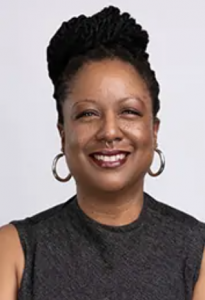OP ED | Providers Must Self-Examine to Explain Black Maternal Health Disparities
- 01
- Mar

When I was a nursing student, I initially wanted to work in the newborn ICU. It was after I saw my first birth, which was delivered by a midwife, I knew I wanted to become a nurse-midwife. I always wanted to be that provider that created an environment where women felt safe and supported. I’ve worked in several community-based health centers since. I had the feeling that things can be done better for women of color. At the time, I didn’t really understand what the issues were, but I knew something was wrong.
It was not until I began to work on my Ph.D. that I began to understand racial disparities in maternal health. When I first started looking at maternal mortality, I was looking at other countries where there were conflicts because I wanted to know how they took care of pregnant women in those situations. One of my colleagues suggested that I look closer at the United States, especially Black women. When I saw the numbers of Black women dying during pregnancy, I thought, “This is crazy.” When I asked why Black women were dying, I heard the standard explanations: they’re poor, they start prenatal care late, they’re uneducated, they have a lot of diseases. All these explanations blamed Black women. I know a lot of Black women, but I didn’t know the Black woman these providers were describing.
About a year into my Ph.D., I started working at Planned Parenthood. It put me in the position again to provide reproductive health care and support women in addressing and maintaining their health. For my dissertation, I interviewed women who suffered life-threatening complications during childbirth or postpartum. I learned so much from the women I interviewed. It moved me to say to providers, “You have to take a look at yourself and the care you’re providing.” It helped me to understand that racism, not race, is a risk factor for pregnant Black women.
Black women are 3-4 times more likely to die during and immediately after pregnancy than white women, and twice as likely to experience a near-death situation during childbirth. There’s a huge gap, and many of the issues are things that we know how to prevent and treat. Part of the problem is that Black women report the signs and symptoms of maternal complications, and they’re dismissed.
I’ve heard these stories repeatedly. Black women are told that they’re drug-seeking when they’re experiencing pain. They’re made to feel that they are exaggerating symptoms or that they’re bothersome. The issue isn’t that they aren’t coming in for care. They have access, and they’re coming in during their first trimester. They’re educated. They take care of themselves and are considered healthy before they enter their pregnancies. But we know that these complications can still happen. When Black women are having symptoms and seek medical care, they need to be listened to and taken seriously.
Doulas can provide the support that Black women need during pregnancy, childbirth and postpartum. They are not healthcare providers, but they are part of the health care team. Doulas provide education, advocacy, and other support that Black women don’t always receive in the traditional healthcare environment. It helps to hold providers accountable when an experienced doula accompanies a pregnant Black woman to her appointments or is present during childbirth.
Not all women have access to doulas, and I’m advocating to ensure that any woman who wants doula support can receive it, have it covered by insurance, and be able to depend on it through pregnancy and postpartum. Pregnancy can be an overwhelming time in a Black woman’s life and having a doula’s support during critical moments can be the difference in her childbirth experience.
Racism is embedded so deeply in our system, and we’re all part of the system. We must ask what the behaviors and policies are that are oppressing people and leading to poor health outcomes. People want to pretend that Black women aren’t dying during pregnancy because of racism, but they are. Racism kills. Even when care providers acknowledge that racism exists, they are quick to point the finger at someone else or some other institution. All providers need to examine their own actions. Providers need to speak up and point out the harmful, racist behaviors they witness. This includes policies as well; too many providers seek cover behind policies, even as those rules have clearly negative outcomes for Black women.
I’m looking at the provider side and what can be improved because when we’re in the position of taking care of someone, we can either be a source of stress, or we can be a source of support. We can’t do both, so what side do we want to fall on?



